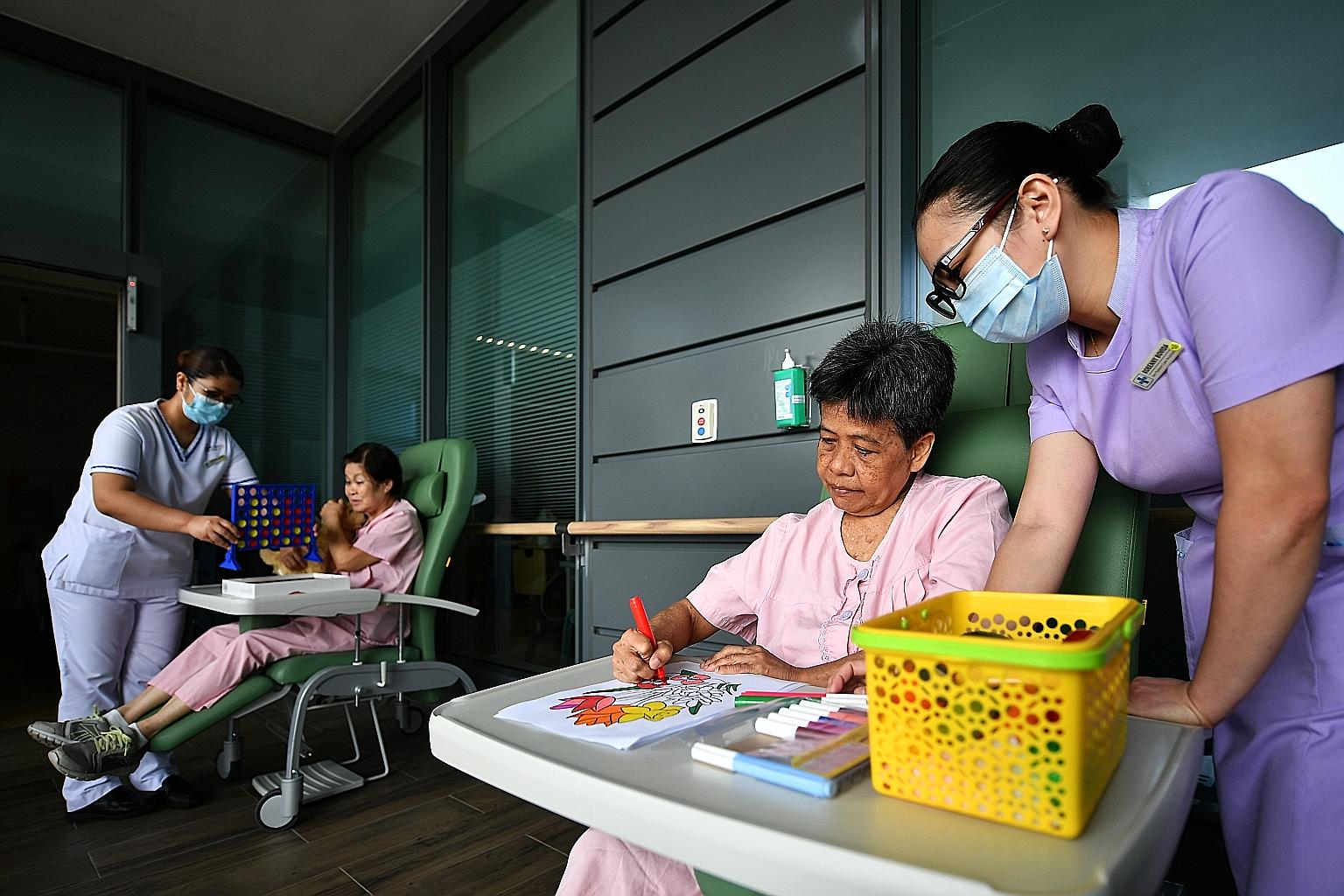Dementia care tailored to the patient makes a difference: Survey
Sign up now: Get ST's newsletters delivered to your inbox

Staff nurse Cabreros Maria Fatima Nicolas (far left) and senior patient care assistant Bote Robenny Bovida (right) at a demonstration of a therapy session yesterday at Changi General Hospital's dementia ward.
ST PHOTO: LIM YAOHUI
When Ms Janice Tan's 76-year-old father had an acute stroke at home on Sept 14, he was rushed to Changi General Hospital (CGH) and warded in the intensive care unit.
"There, he was restrained and he struggled a lot," said Ms Tan, adding that her father, who has mild dementia, was persistent about wanting to go home then.
When he was transferred to the dementia ward, he calmed down after a few days and stayed on for about three weeks.
Ms Tan, 48, a sales and marketing director, said the motivation and positivity that the patients received in the ward made the difference.
The nurses would call him Mr Tan, she said. "If my dad didn't eat something, they asked 'What does he like to eat', and then, they gave him yogurt. Small things like that could get the patient to eat more."
Associate Professor Lim Si Ching, a senior consultant at CGH's geriatric medicine department, shared this person-centred care in the 20-bed dementia ward at a media briefing yesterday on the findings of a recent survey which showed that the minimal use of pharmacological restraints could lead to improved behavioural and mood symptoms, and well-being.
Conducted from mid-August to the end of last month, the CGH survey found that 62 per cent of 137 patients finished their meals on the days they had gone for therapy, which involves doing an activity they like. On the days they did not go, they ate only half of their meals.
Most of them - about 94 per cent - slept for seven to nine hours on the days that they had therapy, compared with 44 per cent on days when there was no therapy.
Prof Lim said the patients were happier and calmer after the therapy sessions, which usually lasted for about 30 to 45 minutes.
Due to the Covid-19 pandemic and safe distancing, the patients cannot gather around a big table as they did in the past. Instead, the sessions are conducted with the patients sitting in individual cushioned chairs fitted with a table, out on a small balcony.
There, they may engage in music therapy, sit-down exercises, art and craft, have breakfast, interact with a doll or with a robotic cat or dog acquired earlier this year.
Some will prepare "food" by cutting up plastic fruit and vegetables, while others fold clothes or watch cooking videos on YouTube, said Prof Lim.
She said the collection of patients' information on their arrival - such as their daily routine, dietary preferences, hobbies, sleep patterns - is key to tailoring the care plan.
"We had an accountant, and we would write sums for him to do. So, while others did their colouring, he did his maths," she said.
Dementia can be caused by more than 70 diseases, of which Alzheimer's disease is the most common. Symptoms can include biting, scratching, shouting, hoarding, anxiety, depression, pathological crying, irritability and psychosis, among others.
"They may sleep in the day, and at 2am, they will knock on the door and say come on, everybody, get up and go to work, or they will go to the kitchen and start cooking," said Prof Lim.
The person with dementia lives in a reality that is constantly changing and confusing, she said.
"I always tell my nurses: Don't look at the difficult behaviour as a challenge, we must look at it as a communication failure."
Instead of restraining an agitated patient, she said, the nurses will find out why: Is it because he wants to go to the toilet, or is he hungry?
Prof Lim introduced person-centred care at the dementia ward - which admits elderly patients with dementia symptoms or delirium - in 2015, and said restraints are used only when there is no choice.
"When we look at persons with dementia, we need to understand that even if their brain is not working very well any more and their memory is not so good... they can still enjoy music, sound, colours, and their sense of humour is often still intact," she said.
Khoo Teck Puat Hospital also uses person-centred care at its dementia ward, and has had a no-restraints record for seven years now.


